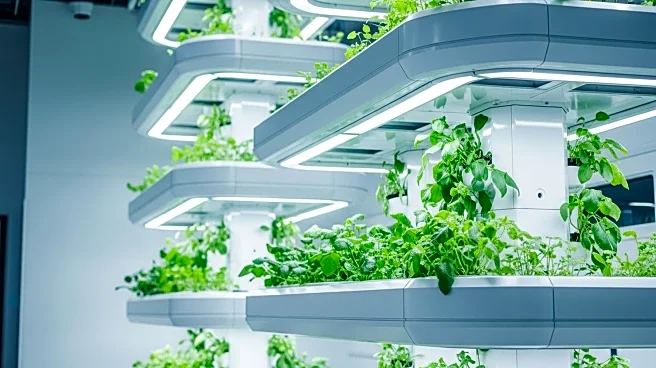What's Happening?
Richard Hall, Chair of FoodBev Media, emphasized the importance of recognizing vertical farming as a contributor rather than a threat at the Vertical Farming World Congress in Amsterdam. He advocates for government support and equal access to incentives and research for vertical farming, which has often been overlooked compared to other agricultural sectors. Energy costs remain a significant challenge, with partnerships and renewable sources being crucial for viability. The sector is expanding its crop range, but Hall advises focusing on a few competitive crops. He identifies leafy greens and strawberries as leading products, while highlighting barriers such as energy supply and business regulation.
Why It's Important?
Vertical farming represents a sustainable solution to food production challenges, offering potential benefits like reduced land use and water consumption. Recognizing it as a contributor could lead to increased investment and policy support, fostering innovation and growth in the sector. As energy costs impact profitability, strategic partnerships and renewable energy integration could enhance sustainability. The focus on competitive crops may drive market leadership and consumer loyalty, influencing the future of agriculture. Addressing regulatory and energy barriers is crucial for the sector's expansion and success.
What's Next?
The push for government recognition and support for vertical farming may lead to policy changes that provide equal access to agricultural incentives and research funding. Energy partnerships and renewable integration are likely to be explored further to mitigate costs and enhance sustainability. As the sector continues to trial new crops, businesses may refine their strategies to focus on those with proven commercial viability. The development of common standards and industry language could accelerate growth and facilitate collaboration among stakeholders.
Beyond the Headlines
Vertical farming's potential to transform agriculture extends beyond immediate economic benefits. It could contribute to food security and environmental sustainability, addressing global challenges like climate change and resource scarcity. The emphasis on innovation and technology in vertical farming may drive advancements in agricultural practices, influencing traditional farming methods. As the sector gains recognition, it could play a pivotal role in shaping future food systems and policies.










